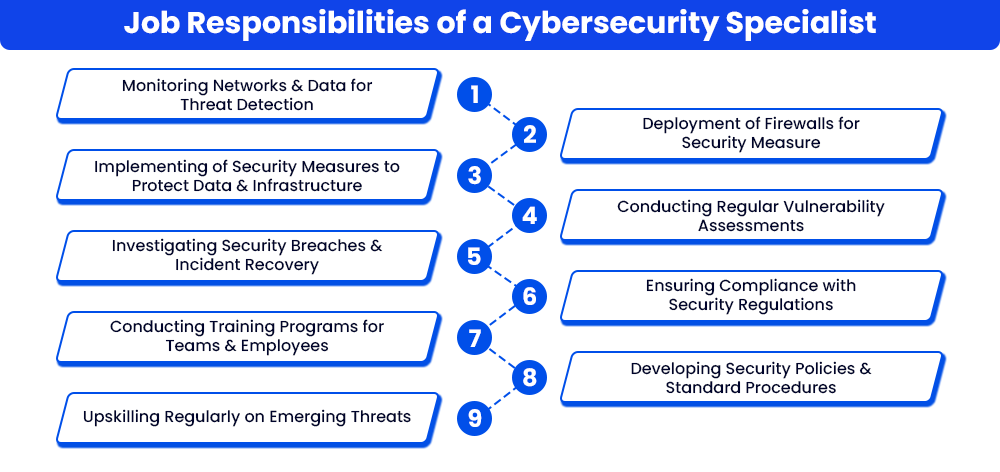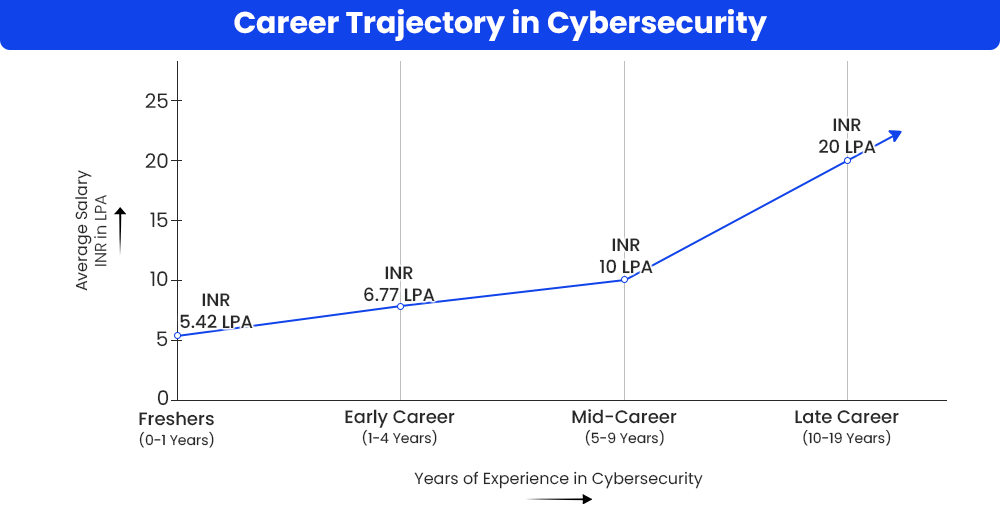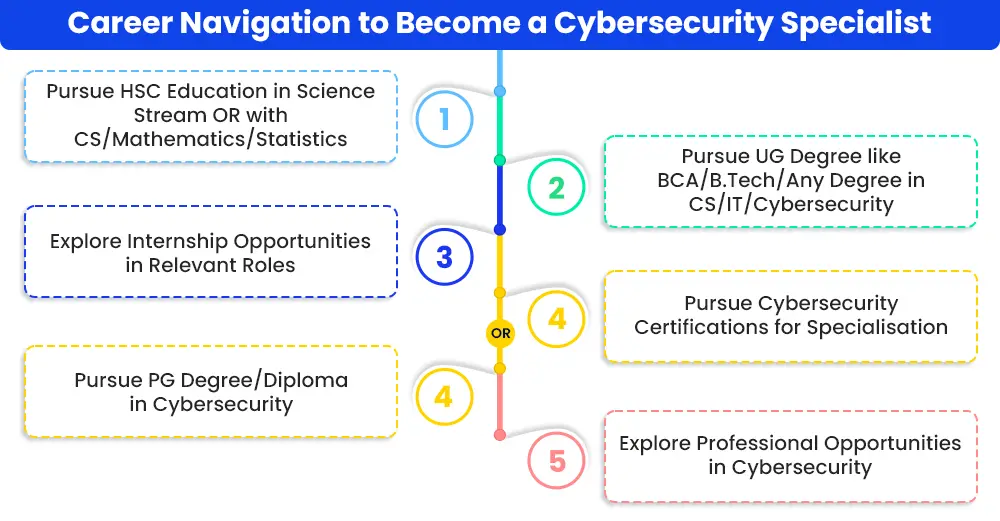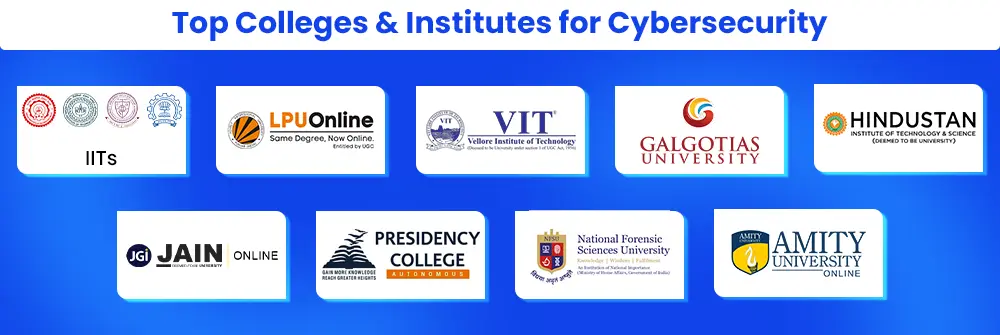The field of cybersecurity, which is a technical domain within IT and computer science, is an emerging area that many technical professionals are turning to in recent years. As data becomes more confidential and crucial to be protected and the data infrastructures form the core of resources for organisations, the need for cybersecurity is growing. As more and more companies are looking to safeguard their data, system infrastructure and digital properties, the demand for professionally-trained cybersecurity specialists is spurring.
This is a career domain where software and IT enthusiasts can venture if they are driven by diagnosing security risks to data systems, identifying sources of such threats or attacks, devising active security measures that can digitally safeguard systems and sensitizing coworkers about the same. This is a dynamic and continuously evolving field that offers a vast variety of options to students and professionals to explore within the domain itself.
Why Choose a Career in Cybersecurity?
Among a number of reasons to consider taking up cybersecurity as your career, here are a few of the most compelling ones. These reasons highlight the overall scope that an individual can expect in this career:
- Growing Job Demand in Contemporary Times: Statistics from across regions pan India and globally, reflect that the demand for professional Cybersecurity analysts, engineers and consultants is on the rise given the increasing need for efficient data and infrastructure security.
- Lucrative Potential for Salary: Trends show that cybersecurity as a career domain offers lucrative compensation packages to entry level as well as senior job holders and hence is a financially appealing domain to venture into.
- Diversifying Career Opportunities: While the field of Cybersecurity continuously evolves and becomes more dynamic, newer roles and niches are emerging for aspirants to explore here. Thus, if you are someone with honed skills in cybersecurity, you would have the option of exploring multiple domains before settling in a niche.
- Scope Across Industries: The employability of cybersecurity experts and professionals is expanding across a number of industries including those like finance, healthcare, IT firms, BFSI organisations, e commerce platforms and so on, thus enhancing scope and career opportunities.
- Multiple Entry Paths to Career: This field requires proficiency across the core domains of Cybersecurity. However, the entry path into the career is quite flexible and branched, allowing those with formal qualifications as well as self-trained aspirants to venture into the field.
Roles & Responsibilities of a Cybersecurity Specialist
Understanding the nature of the responsibilities that this domain encompasses is necessary to make an informed decision about whether it is the right fit for your career aspirations. The role of a cybersecurity specialist includes a number of responsibilities associated with threat anticipation and quick detection of potential threats or security risks, continuous monitoring of existing systems to minimise gap areas for risks, devising security policies and guidelines, solutions to maximise security of digital information and systems etc. The details of these core responsibility areas are illustrated below. 
Key Skills Needed for Cybersecurity
Being a career domain in the technical arena, the skill repertoire for a cybersecurity professional comprises of crucial technical domains as well as soft skills which help to enhance the quality of service a professional is able to provide. These have been elaborated upon below.
Technical Skills & Knowledge to Succeed as a Cybersecurity Specialist
Technical competence is of utmost importance in the domain of cybersecurity, as excellence in the job requires the professional to possess excellent knowledge of core IT domains, cybersecurity, risk detection, threat intelligence and so on. These have been further elaborated upon below:
|
Key Skills |
Specifications |
|
Fundamentals of Security & Networking |
Having a strong grasp over core knowledge areas in cybersecurity including firewalls, VPNs, TCP/IP, network protocols etc. |
|
System Administration |
Being able to proficiently use various operating systems and system administration platforms including those like Linux, macOS, Windows etc. |
|
Threat Intelligence & Analysis |
Being quick and efficient in identifying potential threats to data infrastructure, being able to detech the vulnerable entry points for attackers aand developing security strategies to address the same. |
|
Ethical Hacking |
Being able to simulate hacks on varius systems as part of an ethical attack testing procedure. |
|
Cloud Security |
Being well-versed with measures of security deployed in cloud softwares like Azure, AWS, Google Cloud etc. |
|
Data Encryption |
Being acquainted with the fundamental logic and concepts around data encryption and decryption, including encryption algorithms, hashing techniques etc. |
|
Security Information & Event Management (SIEM) |
Being experienced in tools for SIEM such as Splunk, IBM QRadar etc. |
Soft Skills to Succeed as a Cybersecurity Specialist
Soft skills are also an important component of the competence repertoire for a cybersecurity specialist. Aspects such as strong analytical skills, a knack for continuous learning, problem-solving ability etc. are essential to perform well on the job in addition to being technically proficient. Some of the core soft skill areas of cybersecurity professionals include those mentioned below.
|
Key Skills |
Specifications |
|
Attention to Detail |
Having an eye for detail, including but not limited to being able to spot patterns, gaps in data and so on. |
|
Analytical Thinking |
Being able to approach problems from an analytical mindset such that complex problems can be broken down into smaller components and solved in a chained manner. |
|
Adaptability |
Having an adaptable approach to problem-solving, including identifying changing situations efficiently, devising alternative and Backup plans of action as well as approaching unforeseen attacks/threats efficiently. |
|
Continuous Learning |
Having a knack for and efficiency in continuously learning, staying abreast with latest developments in the field and upskilling oneself in emerging technologies in cybersecurity. |
|
Problem-Solving Skills |
Being proficient in effectively understanding as well as solving novel problems faced in the profession. |
|
Communication Skills |
Being clear and articulate in explaining potential security risks and solutions to stakeholders, both from technical and non-technical standpoints. |
What are the Career Opportunities in Cybersecurity (Types of Options available in Cybersecurity)
Some of the key career domains in cybersecurity relate to system and security administration, penetration testing, cloud penetration, cloud security, threat intelligence, application security, digital forensics etc. This field being continuously evolving in nature, has prospects of many more pathways opening up as cybersecurity becomes more advanced. The field is fairly compensated and career domains such as cloud security, application security, cloud penetration etc. offer the most competitive packages in this domain.
Some of the key job roles that a cybersecurity specialist can explore have been enlisted below along with approximate compensation as per current figures:
|
Career Option |
Average Salary (Per Annum) |
|
Cybersecurity Analyst |
INR 6.5 LPA |
|
IT Security Administrator |
INR 6.26 LPA |
|
Cloud Penetration Tester |
INR 7.13 LPA |
|
Cloud Security Engineer |
INR 11 LPA |
|
Security Consultant |
INR 11.37 LPA |
|
Chief Information Security Officer (CISO) |
INR 63 LPA |
|
Threat Intelligence Analyst |
INR 6.5 LPA |
|
Application Security Engineer |
INR 11.1 LPA |
|
Digital Forensics Analyst |
INR 5.6 LPA |
Career Analysis: Scope of Cybersecurity
Having understood the nature of the roles involved in cybersecurity, it becomes imperative to examine the career’s prospects from an industrial standpoint as well, with respect to the demand of the role, the investments required to venture into the field and the scope for growth in the field.
Demand for Cybersecurity Specialists: Industry Trends
Some of the key industrial insights surrounding cybersecurity as a career domain have been provided below. These shed light on the lucrative as well as expanding nature of the field:
- The overall projected worth of the field of cybersecurity in India is nearly INR 280 billion as of 2026, with an annual growth rate of 18.33%
- The demand for cybersecurity professionals in India is on the rise, and reports by the Economic Times suggest that nearly a growth of 14% of job postings has been seen this year compared to the previous year.
- The field of cybersecurity, despite being one growing domain, experiences unfilled roles as there is a significant skill gap required among technical professionals to practise as a cybersecurity expert.
- Some of the leading regions that have professional opportunities in cybersecurityin India include Bengaluru, Delhi-NCR, Hyderabad, Mumbai etc.
Fees & Cost Involved in Becoming a Cybersecurity Specialist
There are a number of certifications and degree courses available to pursue in cybersecurity that are offered in the online mode as well as regular modes to pursue. Some of the key options to consider in the UG levels include a BCA, a B.Tech or a B.E. in specialisations like computer science, cloud security, cybersecurity etc. Additionally, if a person from a technical background decides to pursue cybersecurity as a career option later in their career journey, there are ample number of certification courses curated specifically for this specialisation that allow graduates and professionals to become certified in practising as cybersecurity experts. Conversely, one can also consider going for PG education via a degree such as by taking up an MCA or an M.Tech.
A number of these courses, being available in the online learning mode, are in a moderately high range along with options available for EMIs, which provide a pocket-freindly alternative to take the courses up. Some of the popularly pursued courses in cybersecurity along with the approximate course fee are mentioned below.
|
Cybersecurity Courses |
Approximate Course Fees |
|
CompTIA Security+ |
INR 40,000 |
|
Certified Ethical Hacker (CEH) Certification |
INR 1,15,000 |
|
Certified Information Systems Security Professional (CISSP) |
INR 66,000 |
|
Certified Information Security Manager (CISM) |
INR 68,000 |
|
Offensive Security Certified Professional (OSCP) |
INR 1,60,000 |
|
INR 1,50,000 |
|
|
INR 2,00,000 |
|
|
INR 87,000 |
|
|
INR 87,000 |
|
|
B.Tech in Computer Science |
INR 3,00,000 |
|
INR 2,50,000 |
|
|
INR 2,20,000 |
|
|
M.Tech in Computer Science |
INR 5,00,000 |
Career Growth Trajectory of Cybersecurity Specialist
The career trajectory in cybersecurity is quite a steep progression, as freshers can earn almost double their initial pay packages with a few years of experience. The scope for career escalation and financial growth are both considerably lucrative in cybersecurity. Moreover, with the right repertoire of skills, one can explore professional opportunities across the globe as well.
Illustrated below is the growth trajectory that one can expect to experience as a professional in the field of cybersecurity, based on latest trends of compensation for this career:

Career Navigator: What Course to Pursue for a Career in Cybersecurity?
As explained above, the pathways to enter into the field of cybersecurity are multiple and hence make the field more accessible to students and aspirants at different stages of their career. Firstly, it is important to have a technical background or have pursued subjects such as mathematics/computer science in the high school level to pursue a technical domain like cybersecurity as a career. At the UG level, while a degree in cybersecurity is helpful for strong foundations, it is not mandatory and students can take up any relevant degree such as a B.Tech or a BCA or a B.E. in a relevant stream such as computer science. After this, one can start exploring professional options or upskill further with specific cybersecurity certificates or PG diplomas/degrees.
The overall career pathway has been highlighted below:

Cybersecurity enthusiasts get the option of choosing the right institution for their career goals from a range of eminent technical institutions including those like the IITs in India, National Forensic Sciences University, private institutions such as Hindustan University, Presidency College, VIT etc.

Conclusion
Cybersecurity is an emerging field providing growing scope and opportunities to students and professionals with a technical background. The diverse range of issues that a professional handles in this domain, alongside the lucrative compensation and global scope of opportunities, make it a career worth considering for technical professionals.
















